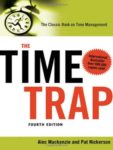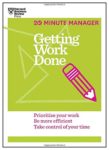You don’t think about time much until one day when you have too little of it to do anything worthwhile. Of the many things taught since childhood, time management is surely one skill that must be a part of every curriculum. No matter if you are a busy executive or a high school student, lack of time management skills can cost you dearly.

“Procrastination is the foundation of all disasters.”
~ Pandora Poikilos
Time does not discriminate. We all have the same number of hours in a day. What makes one person more efficient than others, largely depends on how we manage the time available to us. A simple To-DO list every morning can save you from a lot of pain and help you stay on track to complete you daily and weekly goals.
“The essence of self-discipline is to do the important thing rather than the urgent thing.”
~Barry Werner
Although all this seems common sense and we know that we need to manage our time to live a balanced life, we often easily lose ourselves in the immediate. Technology has helped but it has also brought many more distractions. So how do you make the best of your time? Here are some of the books people have found useful for decades. Readers vouch by the methods, tricks, and tips authors discuss in this book that help you make more time.
First Things First
 Paperback: 384 pages
Paperback: 384 pages
Publisher: Free Press; Reprint edition (January 17, 1996)
ISBN-10: 0684802031, 978-0684802039
Time management is not just about getting the minutes and hours accountable. Time management also means that you assign the right amount of time to the right tasks. In First Things First, Covey and Merrill discuss the importance of finding the most important things in your life and make time for them. The first half of the book nudges you to introspect and find out what’s most important to you. The second half gives you the tools to use your time wisely to achieve your goals.
The 25 Best Time Management Tools and Techniques: How to Get More Done Without Driving Yourself Crazy
 Author: Pamela Dodd, Doug Sundheim
Author: Pamela Dodd, Doug Sundheim
Paperback: 144 pages
Publisher: Peak Performance; 1 edition (December 15, 2005)
ISBN-10: 097695060X, 978-0976950608
There are hundreds of books on time management. Each one or most of these books offer a different perspective on time management. While some books focus on the importance of planning, others prefer to talk about organizing your tasks. If you want to save time on reading a few different books, The 25 Best Time Management Tools and Techniques will help you breeze through all of these perspectives on time management. The book distills the most useful information on time management from 20 different books and compiles all the essential information in this one guide.
Time Management from the Inside Out
 Author: Julie Morgenstern
Author: Julie Morgenstern
Paperback: 304 pages
Publisher: Holt Paperbacks; 2nd edition (September 1, 2004)
ISBN-10: 0805075909, 978-0805075908
Julie Morgenstern takes an analytical approach to time management. She equates time to a closet and then begins to analyze time as you would space management. Her approach is a simple but effective Gather-Analyze-Attack model. Gather all the information about where you spend your time. Then move into the analysis phase to determine how you spend your time, what takes most time, and where is the waste. With this information on hand, attack the tasks and activities that are time hogs and plug the leaks.
The Time Trap
 Author: Alec Mackenzie, Pat Nickerson
Author: Alec Mackenzie, Pat Nickerson
Paperback: 320 pages
Publisher: AMACOM; Fourth Edition edition (June 17, 2009)
ISBN-10:0814413382, 978-0814413388
How we measure time hasn’t hanged and so hasn’t much of human behavior since the 70s. This classic self-help book, that has help thousands for decades, however, has been updated. New technology has brought new distractions and new ways to waste time. Alec McKenzie and Pat Nickerson believe specific goals, clear communication, and a detailed plan is essential to get things done in time. In The Time Trap, the authors share how you can manage each of these aspects and use technology for saving time and avoid distractions.
Still Procrastinating?: The No Regrets Guide to Getting It Done
 Author: Joseph R. Ferrari
Author: Joseph R. Ferrari
Paperback: 256 pages
Publisher: Wiley; 1 edition (September 1, 2010)
ISBN-10: 0470611588, 978-0470611586
Are you a chronic procrastinator? Do you always put off doing things when you can easily do them now? This one habit can wreck havoc with your time. We all procrastinate once in a while, but we cannot make that our default behavior. In Still Procrastinating? Joseph R. Ferrari looks at some of the reasons people put off doing things to tomorrow or later. He negates some common myths like “I work better under pressure” and discusses different types of procrastination.
Getting Work Done
 Author: Harvard Business Review
Author: Harvard Business Review
Paperback: 128 pages
Publisher: Harvard Business Review Press (October 28, 2014)
ISBN: 1625275439, 978-1625275431
Primarily targeted toward managers, Getting Work Done is a short, to-the-point guide on how to organize and manage your tasks. The first couple of chapters talk about how to set goals and prioritize tasks. The authors then points out that disorganized workspace and folders can make you lose precious hours, minutes at a time. The book also shows how you can delegate work and improve communication to stop wasting time.
How to Get Control of Your Time
 Author: Alan Lakein
Author: Alan Lakein
Paperback: 160 pages
Publisher: Signet (February 7, 1989)
Language: English
ISBN: 0451167724, 978-0451167729
This short book packs a punch when it comes to simplifying your goals and sticking to a schedule. While planning is the foundation of organizing time, too much of planning can hold you back from making a decision and begin work. The author digs into the decision making process to help you quickly make good decisions. He also looks at different routine activities like commute, waiting times, and so on to get more value out of these unavoidable activities.
Getting Things Done: The Art of Stress-Free Productivity
 Author: David Allen
Author: David Allen
Paperback: 352 pages
Publisher: Penguin Books; Revised edition (March 17, 2015)
ISBN: 0143126563, 978-0143126560
The latest edition of Getting Things Done is updated with new tech tools for the many GTD fans. It also has many more tips needed to survive in the new workplace and be productive. The author believes that sooner you get the things you want to do on paper or on an app, the more it clears your mind to do the things that you have planned to do. Externalizing what you want to do makes many tasks more clear and easier to achieve.